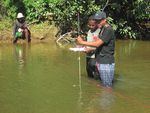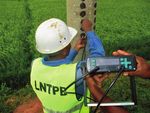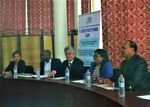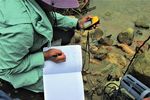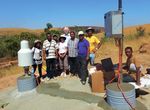Madagascar RURAL ELECTRIFICATION - SMALL HYDRO POWER (SHP) - UNIDO's Open Data Platform
←
→
Page content transcription
If your browser does not render page correctly, please read the page content below
Madagascar
RURAL ELECTRIFICATION – SMALL HYDRO POWER (SHP)
Newsletter n°04 # 2019 / 2020
As executing agency of the Global Environment Facility (GEF), the United Nations for Industrial Development
Organization (UNIDO) launched in 2015 the project entitled "Increased energy access for productive uses through small
hydropower development in rural areas in Madagascar" in close collaboration with the Ministry of Environment and
Sustainable Development (MEDD) and the Ministry of Energy and Hydrocarbons (MEH) and their related entities.
This Newsletter presents some of the major achievements of the GEF/UNIDO project for the year 2019 and forecasts for
2020.
In partnership
with :
SOURCE DE BIEN ETRE, PILIER DU DEVELOPPEMENT
UNIDO Madagascar 01 Newsletter n°4 / # 2019/2020PROJECT OVERVIEW DATES: 20 July 2015 – 15 July 2020 (Extension to
15 October 2021)
KEY OBJECTIVES
OF THE PROJECT
TITLE OF PROJECT:
NATIONAL COUNTERPARTS:
Increased energy access for productive uses
through small hydropower development in rural
Ministry of Environment and Sustainable Deve- At least 2 MW
lopment (MEDD) installed.
areas in Madagascar
• National Coordination Office for climate
PROJECT OBJECTIVE: changes and REDD+ (BNCCC-REDD+)
At least
To stimulate the use of small hydropower to Ministry of Energy and Hydrocarbons (MEH)
reduce Greenhouse Gas emissions and trigger • Rural Electrification Development Agency
13,140 MWh
productive use for income generation, in align- produced annually
(ADER)
ment with strategic and policy priorities of the from SHP;
• Regulatory Office of Electricity (ORE)
Government of Madagascar.
FUNDER: Global Environment Facility (GEF) –
ASSOCIATED SUSTAINABLE DEVELOPMENT GOALS (SDG): 131,400 CO 2
RAV-5 tep. avoided through
direct emission
TOTAL BUDGET: 17.000.000 USD methodology.
■ GRANT: 2.855.000 USD
■ COFINANCING TO BE SECURED: 14.305.000 USD
1 MID-TERM REVIEW OVERVIEW
In 2019, a mid-term review was carried out by two independent • Extend the project for a period of 15 months (until October
experts on the main achievements of the project between 2015 2021) without increasing the available budget;
and 2018. The results were presented during the 4th Steering • Finalize in 2020 the complete studies for the realization of the
Committee meeting held on 11th of July 2019 in the premises of hydroelectric schemes and to secure the co-financing;
the Ministry in charge of Energy. As a reminder, the project is • Stop supporting local turbine manufacturing by the project;
articulated around three components 1) Legal and Regulatory • Improve the communication of the project towards the
Framework, 2) Implementation of Hydroelectric Developments led partners;
by the private sector 3) Capacity building of key players in the • Encourage the support / coaching of private operators;
"small hydropower" sector. • Capitalization and sharing of experience at the end of the
project is necessary;
Overall, the project meets all the objectives announced in the
• Continue the efforts of good coordination with the other Tech-
project document and even exceeds some objectives on certain
nical and Financial Partners as well as with the national
capacity building activities. The overall rating of the project at
partners.
mid-term is "Satisfactory". However, it is proposed to extend the
project by 15 months (until October 2021), mainly in order to
The official request for extension of the project will be proposed to
finalize at best the component 2 relating to the support to the
the GEF (Donors of the project) during February 2020.
implementation of SHP in the field. Indeed, part of the
results could not be measured since the implementation
work has not yet started. Several factors explain this
delay in implementation, mainly the lack of reliable
hydrological input data needed for the design studies.
Overall, the following recommendations were made
during the evaluation and endorsed:
4th steering committee meeting, 11th July Mid-term review presentation during steering
2019, MEEH committee meeting.
2 MAIN ACHIEVEMENTS IN 2019
Below is a list of the main achievements initiated or achieved by • Drafting of a strategic note on the potential for the manufac-
the project over the year 2019: ture of Banki turbines in Madagascar;
• Signature of an agreement in principle between the GEF/UNI-
• A conference at the “Ecole Supérieure Polytechnique d'Anta-
DO project and the Directorate General of Meteorology to
nanarivo” (ESPA) about the specialized professional profile
facilitate the implementation of joint activities;
trades around hydroelectricity;
• Carrying out a technical study on the manufacturing process of
• Submission of final hydrological reports for four potential
prestressed centrifuged concrete pylons by the National Labo-
hydropower sites. The studies were carried out between 2017
ratory of Public Works and Buildings (LNTPB) - Case of the
and 2018 and were successfully completed by the 3ERAE office:
JIRO KANTO project operated by BETC Nanala;
Name of site River Region District Municipality • Participation of two representatives from Madagascar (from
the National Bureau of Standards and the Ministry in charge of
Marobakoly Anjingo Sofia Antsohihy Antsahabe Energy) in the IWA 33 workshop organized by the International
Antsaroro Maevarano Sofia Antsohihy Antsahabe Center for Small Hydroelectricity (ICSHP) in Hangzhou, China
in order to finalize the drafting of the "Technical Guidelines on
Mandalobe Mandalo Bongolava Tsiroanomandidy Maritampona
Small Hydroelectricity".
Fanjahira Efaho Anosy Taolagnaro Ifarantsa
UNIDO Madagascar 02 Newsletter n°4 / # 2019/2020• Co-financing letter signed by the GIZ PERER project for activi- These recommendations are becoming an international
ties related to the legal framework, support to private operators reference for small hydropower.
and capacity building of key stakeholders. • Database of potential sites in the V7V region updated and
• Start of Environmental Impact Studies (PREE/EIES) for the two available;
hydropower development projects (Belaoko Lokoho and • Participation in various exchange platforms on renewable
Andriamanjavona) of the SAVA Region; energy and rural electrification;
• Edition of the
international
guidelines on
small hydro-
power by
ICSHP.
Water flows measures –Efaho River, Anosy Workshop on the elaboration of a "Reception Technical studies on prestressed centrifuged
Region Guide for SHP projects. concrete pylons by the National Laboratory
on Civil Work.
L’ENCADRÉ
3 HIGHLIGHT: CLOSE COLLABORATION WITH THE
DIRECTORATE-GENERAL FOR METEOROLOGY
(DGM)
An agreement in principle was signed in July 2019 to formally define the modalities of collabo-
DGM/UNIDO collaboration during the
ration between the GEF/UNIDO project and the DGM. This agreement provides in particular for:
installation of hydro meteorological stations,
• The mutual sharing of hydrological information and the validation by the DGM of any docu- 2017.
ment involving hydrological analysis (this applies in particular to the carrying out of hydrolo-
gical studies for the realization of hydroelectric development, the realization of feasibility
studies and the realization of the atlas of potential SHP in Vatovavy Fitovinany region);
• Support for the establishment of a "Climate-Energy" platform;
• The participation of the DGM during field missions to validate the quality of hydro-meteoro-
logical station installations so that they comply with the standards defined by the World
Meteorological Organization (WMO);
• The participation of a representative of the DGM in the Steering Committee meetings of the
GEF/UNIDO project.
Extract from an atlas cartography for the
The project is pleased with this already operational and effective collaboration and thanks the Vatovavy Fitovinany Region validated by the
DGM and its team for the work so far accomplished and coming. DGM, 2019.
4 ZOOM : ENVIRONMENTAL AND SOCIAL IMPACT STUDIES
FOR HYDROELECTRIC PROJECTS
One of the essential studies prior to the construction of a SHP order to carry out the studies over a full year and to define the
project is the environmental and social impact study. This study environmental baseline scenario and to carry out in-depth local
identify all the impacts (positive and negative) of the projects on socio-economic surveys and consultations. These studies will
both the environment and human well-being (economic and define a certain number of corrective measures and, if necessa-
social). For the two hydropower projects of the SAVA Region ry, compensation measures to be taken into account at each
(Andriamanjavona and Belaoko Lokoho) jointly supported with stage of project implementation. The private operators pre-se-
KfW, GIZ and ADER, the consulting firm “Biotope Madagascar” lected for the implementation of the two projects are involved in
was selected through a tender to carry out these studies. this process.
Preliminary files had been submitted to the ONE (National Office
of the Environment) in order to investigate and notify
whether the project requires a complete and detailed
Environmental and Social Impact Assessment or
whether an Environmental Commitment Programme is
sufficient.
The environmental aspects of both projects are
rigorously addressed and follow international
standards for both the power generation and distribu-
tion parts of the project. Two field missions have been Field discussion about Social and Hydro-biological studies on Lokoho River,
organized (respectively in April and October 2019) in ENvironmental study, Commune of Belaoko, SAVA Region, Octobre 2019
April 2019
UNIDO Madagascar 03 Newsletter n°4 / # 2019/20205 SPOTLIGHT DID YOU KNOW?
Mr François COLLOMBAT and Mr Milson RATSARAEFADAHY, respec- What « in stream flow » is ?
tively hydropower expert and rural electrification expert for the
project. Within the framework of the implementation of a hydraulic structure
(Drinking water supply, hydro-agricultural development or SHP) the
Mr. François COLLOMBAT, with an experience water of a river is diverted by an intake structure (dam/threshold) to be
of more than 40 years in the hydropower consumed (hydro-agricultural development, drinking water supply) or
sector, brings his technical skills in design, borrowed (hydroelectric development). As a result, a more or less
operation and maintenance as well as the legal significant decrease in water quantity is inevitable downstream (after)
and regulatory framework on hydropower. Mr. the intake structure. This decrease can obviously cause negative
Collombat remotely follows technical impacts on biodiversity and human well-being.
advances and carries out 2 missions per year Thus, at the crossroads of the fields of water management and water
in Madagascar. law, the in stream flow is the flow that must be permanently maintained
Mr. Milson RATSARAEFADAHY, former Techni- in a watercourse immediately downstream of a hydraulic structure to
cal Director of Rural Electrification Agency safeguard biological balances and downstream water uses. In stream
(ADER), has more than 30 years of experience flow is therefore not a hydrological concept, even if it is expressed in
in the energy sector and specifically in rural m3/s, but a regulatory constraint imposed by legal framework to a
electrification projects. Based in Antananarivo, hydraulic project manager.
his valuable technical expertise as well as his In Madagascar, despite a highly endemic biodiversity and very varied
knowledge on the environmental aspect are hydrological regimes, there is not yet a specific law on the
essential to the success of the project. determination of in-stream flows. Regulatory work should therefore be
encouraged under the impetus of the Ministry in charge of Water,
Thanks to both of them for their involvement and dedication! Ministry in charge of Environment and Ministry in charge of Energy.
6 NEXT STEPS IN 2020
FINALIZATION OF ODA, DAO AND SUPPORT FOR THE SETTING UP OF DRAFTING OF A TECHNICAL NOTE
START OF WORKS/WORKSITES A "CLIMATE ENERGY" PLATFORM ON THE DETERMINATION OF IN
It is essential that the year 2020 sees the As validated during the last Steering Committee STREAM FLOWS ADAPTED TO THE
finalization of detailed feasibility studies meeting, the implementation of a CONTEXT OF MADAGASCAR
(including the economic, technical, "Climate-Energy" technical platform is relevant,
environmental and financial part) for each in particular in order to facilitate interministerial During the design phase of each hydroelectric
hydropower project supported by the information sharing and schedule planning development project in Madagascar, there are
GEF/UNIDO project. The start of field work after meetings between representatives of the MEEH, still uncertainties regarding the methodology to
obtaining the authorization/concession the MEED and the DGM in order to anticipate, be considered for determining in stream flows.
contracts is planned for late 2020 / early 2021 among other things, the negative and/or The references are often international and
at the latest. positive impacts of meteorology on electricity sometimes not adapted to the climatic and
production. environmental context of Madagascar. A
strategic note will therefore be developed to
contribute to and contextualize the subject of in
stream flow.
Graphic Design: geckoloko
Photo Credit: ONUDI
Contact
UNIDO Office in Madagascar
Bât Ariane 5, Zone Galaxy Andraharo +261 20 23 365 40 ONUDI
BP 1348 – Antananarivo 101 - MADAGASCAR office.madagascar@unido.org Madagascar
UNIDO Madagascar 04 Newsletter n°4 / # 2019/2020You can also read





